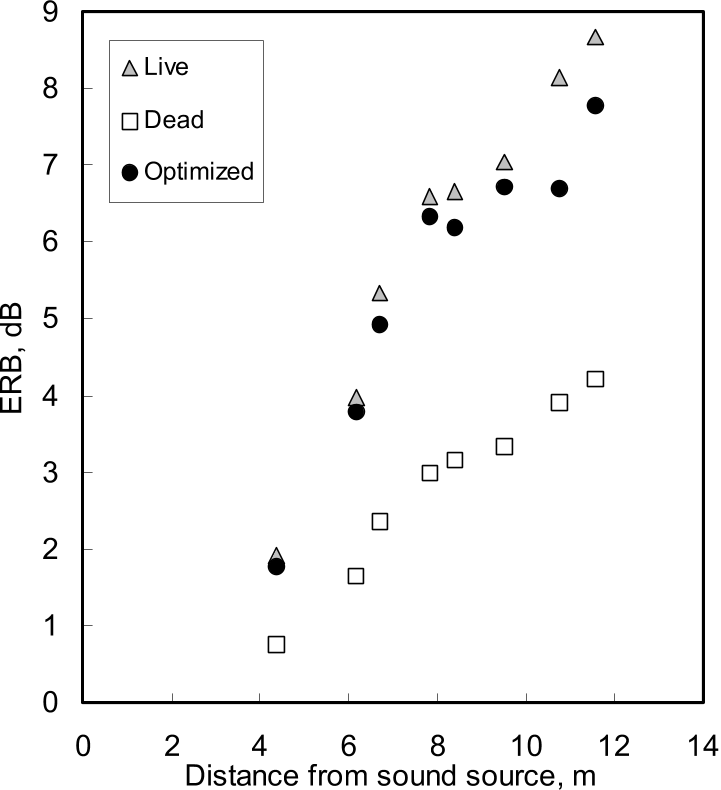
Publisher’s version / Version de l'éditeur:
Journal of the Acoustical Society of America, 113, June 6, pp. 3233-3244, 2003-
06-01
READ THESE TERMS AND CONDITIONS CAREFULLY BEFORE USING THIS WEBSITE.
https://nrc-publications.canada.ca/eng/copyright
Vous avez des questions?
Nous pouvons vous aider. Pour communiquer directement avec un auteur, consultez la
première page de la revue dans laquelle son article a été publié afin de trouver ses coordonnées. Si vous n’arrivez
pas à les repérer, communiquez avec nous à PublicationsArchive-ArchivesPublications@nrc-cnrc.gc.ca.
Questions? Contact the NRC Publications Archive team at
PublicationsArchive-ArchivesPublications@nrc-cnrc.gc.ca. If you wish to email the authors directly, please see the
first page of the publication for their contact information.
NRC Publications Archive
Archives des publications du CNRC
This publication could be one of several versions: author’s original, accepted manuscript or the publisher’s version. /
La version de cette publication peut être l’une des suivantes : la version prépublication de l’auteur, la version
acceptée du manuscrit ou la version de l’éditeur.
For the publisher’s version, please access the DOI link below./ Pour consulter la version de l’éditeur, utilisez le lien
DOI ci-dessous.
https://doi.org/10.1121/1.1570439
Access and use of this website and the material on it are subject to the Terms and Conditions set forth at
On the importance of early reflections for speech in rooms
Bradley, J. S.; Sato, H.; Picard, M.
https://publications-cnrc.canada.ca/fra/droits
L’accès à ce site Web et l’utilisation de son contenu sont assujettis aux conditions présentées dans le site
LISEZ CES CONDITIONS ATTENTIVEMENT AVANT D’UTILISER CE SITE WEB.
NRC Publications Record / Notice d'Archives des publications de CNRC:
https://nrc-publications.canada.ca/eng/view/object/?id=dd3c1e7a-8d8d-440e-bbcd-04c69ef20419
https://publications-cnrc.canada.ca/fra/voir/objet/?id=dd3c1e7a-8d8d-440e-bbcd-04c69ef20419

On the importance of early reflections for speech in
rooms
Bradley, J.S.; Sato, H.; Picard, M.
NRCC-45431
A version of this document is published in / Une version de ce document se trouve dans :
Journal of Acoustical Society of America, v. 113, no. 6, June 2003, pp. 3233-3244
http://irc.nrc-cnrc.gc.ca/ircpubs

On the Importance of Early Reflections for Speech in Rooms
J.S. Bradley and H. Sato
National Research Council, Ottawa, Canada, K1A 0R6
M. Picard
Ecole d’orthophonie et d’audiologie, Université de Montréal, Montréal, Canada, H3C 3J7
Shortened title: “Early reflections for speech”
PACS numbers: 43.55.Hy, 43.71.Gv
Received: ___________________________________________________________
Early reflections for speech - 1

ABSTRACT
This paper presents the results of new studies based on speech intelligibility tests in
simulated sound fields and analyses of impulse response measurements in rooms used for
speech communication. The speech intelligibility test results confirm the importance of
early reflections for achieving good conditions for speech in rooms. The addition of early
reflections increased the effective signal-to-noise ratio and related speech intelligibility
scores for both impaired and non-impaired listeners. The new results also show that for
common conditions where the direct sound is reduced, it is only possible to understand
speech because of the presence of early reflections. Analyses of measured impulse
responses in rooms intended for speech show that early reflections can increase the
effective signal-to-noise ratio by up to 9 dB. A room acoustics computer model is used to
demonstrate that the relative importance of early reflections can be influenced by the
room acoustics design.
Early reflections for speech - 2

I INTRODUCTION
The beginnings of our understanding of how we perceive sound reflections that arrive
within a short time after the direct sound can be traced to the work of Joseph Henry in the
1850s [1]. Work by Haas [2] and Wallach et al. [3] showed explicitly how early
reflections are integrated with the direct sound to make the direct sound seem to be
effectively louder. Lochner and Burger [4] carried out extensive experiments to
determine exactly how delayed reflections affected articulation test results as a function
of the amplitude and delay time of an early-arriving reflection. Although these early
results demonstrated an extensive understanding of the benefits of early reflections to
speech intelligibility in rooms, they sometimes focussed on the negative effects of early
reflections. For example, Haas considered the point at which early reflections became
disturbing. Although the early work of Lochner and Burger and others provides a solid
basis for the importance of early reflections, they provide little information on the
expected improvements to speech intelligibility scores in actual rooms due to early
reflection energy.
Lochner and Burger’s results suggest that speech energy in early arriving reflections is
more or less equivalent to similar amounts of direct speech energy in terms of increasing
speech intelligibility scores. They developed the concept of useful-to-detrimental sound
ratios in which ‘useful’ is defined as the sum of the direct and early-reflected speech
energy and ‘detrimental’ is the sum of the later-arriving speech reflections and the
ambient noise. This concept has been shown to be well correlated with speech
intelligibility test scores in a wide range of rooms [5-7] and to be strongly correlated [8]
with the newer speech transmission index (STI) concept.
Early reflections for speech - 3





